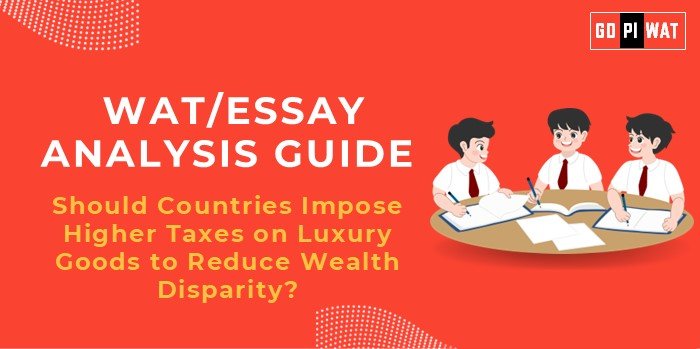📋 WAT/Essay Analysis Guide: Should Countries Impose Higher Taxes on Luxury Goods to Reduce Wealth Disparity?
🌐 Understanding the Topic’s Importance
Addressing wealth disparity is critical for economic stability and social cohesion. Analyzing luxury taxes provides insights into fiscal policy tools and their societal impacts.
📑 Effective Planning and Writing
- Time Allocation (30 minutes):
- Reading & Planning: 5 minutes
- Writing: 20 minutes
- Review: 5 minutes
- Preparation Tips: Gather data on global wealth inequality, identify key stakeholders, and analyze case studies of taxation policies.
✍️ Introduction Techniques
- Contrast Approach: “While global wealth grows, the gap between the richest and poorest widens, prompting countries to reconsider luxury taxes as a fiscal solution.”
- Solution-Based Introduction: “Luxury taxes offer a pragmatic approach to mitigating wealth disparity, leveraging high-income consumption for public welfare funding.”
📊 Structuring the Essay Body
- Achievements: Discuss fiscal benefits and behavior changes supported by statistics.
- Challenges with Comparative Analysis: Highlight gaps using global benchmarks (e.g., Norway, France).
- Future Outlook: Explore complementary reforms like progressive wealth taxes and universal basic income.
📈 Concluding Effectively
- Balanced Perspective: “Luxury taxes provide incremental benefits in addressing wealth disparity but require integration with systemic reforms.”
- Global Comparison Conclusion: “As global experiences show, the success of luxury taxes depends on targeted implementation and broader socio-economic policies.”
📋 Analyzing Successes and Shortcomings
- Achievements: Revenue generation, social program funding.
- Challenges: Limited impact on wealth concentration, potential market disruptions.
- Global Context: Comparative insights from Norway, France, and China.
💡 Recommendations for Sustainable Progress
- Introduce progressive luxury tax frameworks tailored to local economies.
- Strengthen enforcement mechanisms to curb tax evasion.
- Integrate tax revenues with welfare-oriented programs.
📄 Sample Short Essays
- Balanced Perspective: “Luxury taxes, while not a panacea, serve as valuable fiscal tools for promoting equity. Their success lies in integrating them with comprehensive wealth redistribution strategies.”
- Solution-Oriented: “By taxing luxury goods, governments can simultaneously fund social programs and encourage conscious consumerism, fostering inclusive economic growth.”
- Global Comparison: “Luxury taxes, as seen in Norway and France, provide lessons in balancing revenue generation with social equity, highlighting the need for localized adaptations.”


